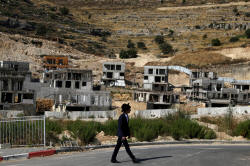Nordic fund KLP excludes 16 companies over links to Israeli settlements
in West Bank
 Send a link to a friend
Send a link to a friend
 [July 05, 2021] By
Gwladys Fouche and Simon Jessop [July 05, 2021] By
Gwladys Fouche and Simon Jessop
OSLO (Reuters) -Norway's largest pension
fund KLP said on Monday it would no longer invest in 16 companies
including Alstom and Motorola because of their links to Israeli
settlements in the West Bank.
Along with a number of other countries, Norway considers the settlements
a breach of international law. A 2020 United Nations report said it had
found 112 companies that have operations linked to the region, home to
around 650,000 Israelis. Israel regards settlements as legitimate.
The companies, which span telecoms, banking, energy and construction,
all help facilitate Israel's presence and therefore risk being complicit
in breaches of international law, and against KLP's ethical guidelines,
it said in a statement.
"In KLP's assessment, there is an unacceptable risk that the excluded
companies are contributing to the abuse of human rights in situations of
war and conflict through their links with the Israeli settlements in the
occupied West Bank," KLP said.

The move by KLP follows a decision by Norway's sovereign wealth fund in
May to exclude two companies linked to construction and real estate in
the Palestinian territories.
KLP said it had sold shares in the companies worth 275 million Norwegian
crowns ($31.81 million) and as of June had completed the process. In
Motorola and Alstom, it had also sold its bond holdings.
Selling Motorola Solutions was "a very straightforward decision" as its
video security and software was used in border surveillance.
Motorola and Alstom did not immediately reply to requests for comment.
A senior member of the Palestine Liberation Organization (PLO) welcomed
KLP's move.
"The Norwegian step is significant to stop dealing with companies that
support settlements on Palestinian land. We welcome it, and we urge
other countries to take similar steps," Wasel Abu Youssef told Reuters.
[to top of second column] |

A Jewish settler walks past Israeli settlement construction sites
around Givat Zeev and Ramat Givat Zeev in the Israeli-occupied West
Bank, near Jerusalem June 30, 2020. REUTERS/Ammar Awad/File Photo

"After the United Nations announced its blacklist of companies that operate in
settlements, all countries must either suspend the work of these companies or
boycott them."
Telecoms companies including Bezeq and Cellcom Israel were removed as the
services they provide help make the settlements more attractive residential
areas, KLP said, while banks including Leumi helped finance the infrastructure.
In a similar vein, construction and engineering groups such as Alstom and local
peers Ashtrom and Electra were responsible for building the infrastructure,
while Paz Oil helped power them.
The other companies to be excluded were: Bank Hapoalim, Israel Discount Bank,
Mizrahi Tefahot Bank, Delek Group, Energix Renewable Energies, First
International Bank of Israel and Partner Communications.
Bezeq, Mizrahi Tefahot Bank, Bank Hapoalim and Partner Communications declined
to comment. The other companies did not immediately reply to requests for
comment.
Telecoms company Altice, which was listed until January 2021, was also excluded.
Altice did not immediately reply to a request for comment.
($1 = 8.6460 Norwegian crowns)
(Reporting by Gwladys Fouche in Oslo and Simon Jessop in London, Steven Scheer
and Maayan Lubell in Jerusalem and Ali Sawafta in Ramallah, editing by Louise
Heavens, Kirsten Donovan)

[© 2021 Thomson Reuters. All rights
reserved.] Copyright 2021 Reuters. All rights reserved. This material may not be published,
broadcast, rewritten or redistributed.
Thompson Reuters is solely responsible for this content. |